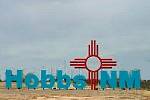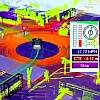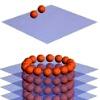Futuristic Technology

A $1 billion dollar smart city is being built to test futuristic technology.
Pegasus Global, a technology development firm and contractor for military technologies, is building a smart city to test new technologies.
The city will be developed on 15 square miles of property near Hobbs, New Mexico, about 70 miles from Roswell.
It will resemble the city of Rock Hill, in South Carolina.
The blueprint is to build a typical American town for a population of 35,000 residents living with old and current technologies - streets, electricity, lighting, sewage, houses, highways, retail stores and commercial buildings.
The city will have all the amenities - from telecommunication networks and computers to flushing toilets and washing machines.
Everything you would expect to find in a city. Except one thing.
It will have no residents. It will be a ghost town.
Emerging Technologies
 The city known as CITE (Centre for Innovation, Testing and Evaluation) has a singular purpose - to evaluate the challenges and benefits of integrating futuristic technology in existing cities.
The city known as CITE (Centre for Innovation, Testing and Evaluation) has a singular purpose - to evaluate the challenges and benefits of integrating futuristic technology in existing cities.
The problem with futuristic technology is that there is no place for it to test it's integration into existing infrastructures to find out how well it works.
 For example, where would Julie and Scott Brushaw test the integration of their smart grid technology for solar roads?
For example, where would Julie and Scott Brushaw test the integration of their smart grid technology for solar roads?
How do we evaluate the efficiencies of emerging technologies in solar power technology or wind turbine technology?
If Tony Fadell wants to integrate his smart house technology into existing homes. How does he test it?
The hurtles for permits and regulatory approval to test futuristic technology in the real world can be daunting.
It took years for Sebastian Thrun and the sponsorship resources of Google to get permission to test his self-driving futuristic technology cars on California roads.
 But those tests provided sufficient evidence for the State of Nevada to draft legislation allowing self-driving cars on their roads. California is now doing the same.
But those tests provided sufficient evidence for the State of Nevada to draft legislation allowing self-driving cars on their roads. California is now doing the same.
The city of CITE provides an alternative, real environment for the evaluation of innovations created in laboratories and universities, or by independent inventors.
According to Robert H. Brumley, CEO for Pengasus, CITE will be an easier alternative for innovators to assess the benefits, impact, costs and challenges of merging their innovations with existing infrastructures.
The location for CITE was chosen because of it's proximity to the Los Alamos and Sandia federal research laboratories. Revenues will be derived from charging access and user fees as well as from the sale of excess energy generation.
Construction of CITE begins this year.
Source: pegasusglobalholdings.com
Google Car
 Image flying to Las Vegas and embarking from your plane at the airport. While waiting to pickup your luggage, you telephone for a cab. Then, you collect your luggage, step outside and your car arrives. But there is no one driving it.
Image flying to Las Vegas and embarking from your plane at the airport. While waiting to pickup your luggage, you telephone for a cab. Then, you collect your luggage, step outside and your car arrives. But there is no one driving it.
A voice from the car greets you as the trunk opens. The car politely asks you to place your luggage in the trunk.
The back door opens and the car asks you to get in and fasten your seat belt. "Where would you like to go?" asks the car. You respond with the hotel name. "We'll be there in 15 minutes," says the car as it moves away from the curb and drives itself to your destination.
Welcome to the Las Vegas of the future.
Nevada has become the first state to approve driveless cars by accepting an application for the Google car to drive on it's roads.
Bruce Breslow of the Nevada Department of Motor Vehicles, also revealed a special license plate for driveless cars.
 The plate will display an infinity symbol, which according to Breslow is a symbol that best represents this futuristic technology.
The plate will display an infinity symbol, which according to Breslow is a symbol that best represents this futuristic technology.
Nevada defines driverless cars as using "artificial intelligence, sensors and global positioning system coordinates to drive itself without the active intervention of a human operator."
Owners of a Google car or similar driveless cars will need to obtain a special driver license and comply with specific regulations. For example, the cars must be equipped with smart boxes and owners will be responsible for how the car functions.
California, Hawaii and Florida are also considering similar legislation for driverless cars.
Source: dmvnv.com


|
| Student gets 1.2 million dollar investment for his dicycle invention. |

|
| New handheld device can identify you by scanning the veins in your hands. |

|
| Man flies over Grand Canyon with jet engines on his back. |





